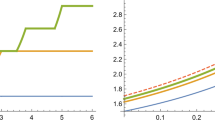Abstract
This paper presents scheduling algorithms for procrastinators, where the speed that a procrastinator executes a job increases as the due date approaches. We give optimal off-line scheduling policies for linearly increasing speed functions. We then explain the computational/numerical issues involved in implementing this policy. We next explore the online setting, showing that there exist adversaries that force any online scheduling policy to miss due dates. This impossibility result motivates the problem of minimizing the maximum interval stretch of any job; the interval stretch of a job is the job’s flow time divided by the job’s due date minus release time. We show that several common scheduling strategies, including the “hit-the-highest-nail” strategy beloved by procrastinators, have arbitrarily large maximum interval stretch. Then we give the “thrashing” scheduling policy and show that it is a Θ(1) approximation algorithm for the maximum interval stretch.
Similar content being viewed by others
References
Albers, S., & Fujiwara, H. (2006). Energy-efficient algorithms for flow time minimization. In Lecture notes in computer science : Vol. 3884. Proceedings of the 23rd annual symposium on theoretical aspects of computer science (STACS) (pp. 621–633). Berlin: Springer.
Alidaee, B., & Womer, K. (1999). Scheduling with time dependent processing times: review and extensions. Journal of Operational Research Society, 50, 711–720.
Arkin, E. M., Bender, M. A., Mitchell, J. S. B., & Skiena, S. S. (1999). The lazy bureaucrat scheduling problem. In Proceedings of the 6th workshop on discrete algorithms WADS (pp. 122–133).
Arkin, E. M., Bender, M. A., Mitchell, J. S. B., & Skiena, S. S. (2003). The lazy bureaucrat scheduling problem. Information and Computation, 184(1), 129–146.
Bachman, A., Janiak, A., & Kovalyov, M. Y. (2002). Minimizing the total weighted completion time of deteriorating jobs. Information Processing Letters, 81(2), 81–84.
Bansal, N., & Pruhs, K. (2005). Speed scaling to manage temperature. In Lecture Notes in Computer Science : Vol. 3404. Proceedings of the 22nd annual symposium on theoretical aspects of computer science (STACS) (pp. 460–471). Berlin: Springer.
Bansal, N., Kimbrel, T., & Pruhs, K. (2004). Dynamic speed scaling to manage energy and temperature. In Proceedings of the 45th symposium on foundations of computer science (FOCS) (pp. 520–529).
Bender, M. A., Chakrabarti, S., & Muthukrishnan, S.(1998). Flow and stretch metrics for scheduling continuous job streams. In Proceedings of the 9th annual ACM-SIAM symposium on discrete algorithms (SODA) (pp. 270–279).
Bender, M. A., & Rabin, M. O. (2002). Online scheduling of parallel programs on heterogeneous systems with applications to Cilk. Theory of Computing Systems Special Issue on SPAA00, 35, 289–304.
Bunde, D. P. (2006). Power-aware scheduling for makespan and flow. In Proceedings of the 18th ACM symposium on parallelism in algorithms and architectures (SPAA) (pp. 190–196).
Chekuri, C., & Bender, M. A. (2001). An efficient approximation algorithm for minimizing makespan on uniformly related machines. Journal of Algorithms, 41, 212–224.
Chudak, F. A., & Shmoys, D. B. (1999). Approximation algorithms for precedence-constrained scheduling problems on parallel machines that run at different speeds. Journal of Algorithms, 30(2), 323–343. An earlier version appears in SODA ’97
Davis, E., & Jaffe, J. M. (1981). Algorithms for scheduling tasks on unrelated processors. Journal of the ACM, 28(4), 721–736.
Demaine, E. D., Mitchell, J. S. B., & O’Rourke, J. (2005). The open problems project. Retrieved February 13, 2005 from http://maven.smith.edu/~orourke/TOPP/.
Eppstein, D. (2007). Geometry junkyard, computational and recreational geometry pointers. Retrieved April 6, 2007 from http://www.ics.uci.edu/~eppstein/junkyard/open.html.
Fleischer, L., & Skutella, M. (2002). The quickest multicommodity flow problem. In Lecture notes in computer science : Vol. 2337. Proceedings of the 9th integer programming and combinatorial optimization (IPCO) conference (pp. 36–53). Berlin: Springer.
Fleischer, L., & Skutella, M. (2003). Minimum cost flows over time without intermediate storage. In Proceedings of the 14th annual ACM-SIAM symposium on discrete algorithms (SODA) (pp. 66–75).
Gawiejnowicz, S., & Pankowska, L. (1995). Scheduling jobs with varying processing times. Information Processing Letters, 54(3), 175–178.
Gawiejnowicz, S., Kurc, W., & Pankowska, L. (2002). A greedy approach for a time-dependent scheduling problem. In Lecture notes in computer science (Vol. 2328, pp. 79–86). Berlin: Springer.
Hepner, C., & Stein, C. (2002). Minimizing makespan for the lazy bureaucrat problem. In Lecture notes in computer science : Vol. 2368. Proceedings of the 8th Scandinavian workshop on algorithm theory (SWAT) (pp. 40–50). Berlin: Springer.
Irani, S., & Pruhs, K. R. (2005). Algorithmic problems in power management. SIGACT News, 36(2), 63–76.
Jansen, K., & Porkolab, L. (1999). Improved approximation schemes for scheduling unrelated parallel machines. In Proceedings of the 31st annual ACM symposium on theory of computing (pp. 408–417).
Karger, D., Stein, C., & Wein, J. Scheduling algorithms. In Atallah M. J. (Ed.), Handbook of algorithms and theory of computation, CRC Press, Boca Raton, 1998
Lawler, E. L., & Labetoulle, J. (1978). On preemptive scheduling of unrelated parallel processors by linear programming. Journal of the ACM, 25(4), 612–619.
Orda, A., & Rom, R. (1990). Shortest-path and minimum-delay algorithms in networks with time-dependent edge-length. J. ACM, 37(3), 607–625.
O’Rourke, J. (1981). Advanced problem 6369. In American mathematical monthly.
Pruhs, K., van Stee, R., & Uthaisombut, P. (2005). Speed scaling of tasks with precedence constraints. In Proceedings of the 3rd workshop on approximation and online algorithms (WAOA) (pp. 307–319).
Uysal-Biyikoglu, E., Prabhakar, B., & El Gamal, A. (2002). Energy-efficient packet transmission over a wireless link. IEEE/ACM Transactions on Networking, 10(4), 487–499.
Author information
Authors and Affiliations
Corresponding author
Additional information
Research of M.A. Bender was supported in part by NSF Grants CCR-0208670, CCF-0621439/0621425, CCF-0540897/05414009, CCF-0634793/0632838, and CNS-0627645.
Rights and permissions
About this article
Cite this article
Bender, M.A., Clifford, R. & Tsichlas, K. Scheduling algorithms for procrastinators. J Sched 11, 95–104 (2008). https://doi.org/10.1007/s10951-007-0038-4
Received:
Accepted:
Published:
Issue Date:
DOI: https://doi.org/10.1007/s10951-007-0038-4




